Gujarat's Royal Heritage: Top Palaces You Must Visit
The opulent lifestyles of former rulers are reflected in the opulent palaces of Gujarat, which exhibit a fusion of Indian and European architectural styles. Let us look into some of the most remarkable palaces that you should incorporate into your Gujarat travel itinerary.
The List Of Best Palaces In Gujarat
Laxmi Vilas Palace, Vadodara
Starting with the Laxmi Vilas Palace in Vadodara, the crown gem of Gujarat's palaces sets us on an adventure. This castle is so majestic that some of the most well-known palaces in Rajasthan seem little in relation. Designed in 1890, it is a flawless illustration of the Indo-Saracenic style, which combines European and Indian ideas.
Imagine a palace four times larger than Buckingham Palace in London - that is Laxmi Vilas' scale. Situated on 500 acres of vast territory, it boasts lovely gardens. Still one of the biggest private residences worldwide, the royal family resides here.
Entering will make you feel as though you have gone back in time. The palace combines Indian and British country home designs. Particularly lovely is the Darbar Hall, the venue of significant gatherings. Its Venetian floor is unique, its beautiful glass windows reflect the great embellishments covering its walls.
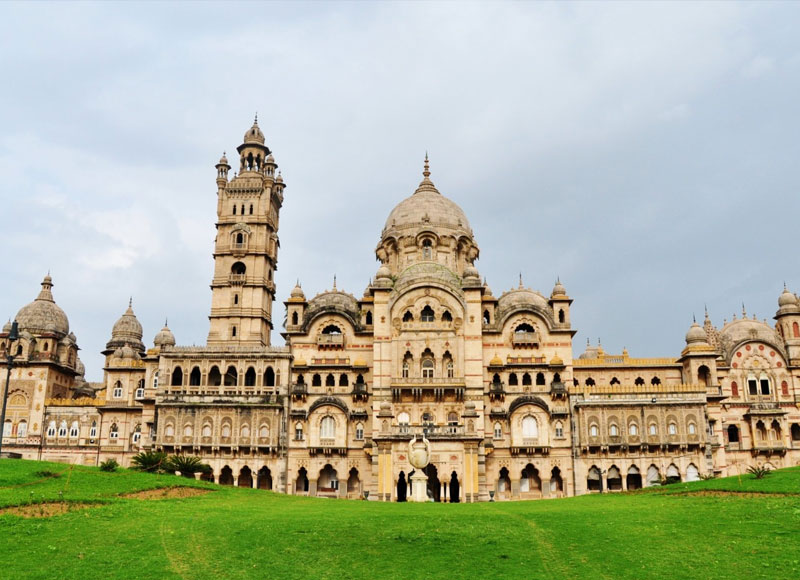
Aina Mahal, Bhuj
Next on our list is the Aina Mahal in Bhuj, which means "Palace of Mirrors." This palace lives up to its name with its famous Hall of Mirrors. Built in the 18th century, it shows how Indian rulers were inspired by European styles.
When you walk into the Hall of Mirrors, you'll be amazed by the shiny marble walls covered with decorations and mirrors. Look down, and you'll see beautiful tiles on the floor. To keep things cool in the hot Gujarat weather, there are even fountains inside!
The palace was built by Maharaja Lakhpat ji, with help from an architect named Ramsinhji who had spent many years in Europe. This explains why the palace has such a unique mix of Indian and European styles.
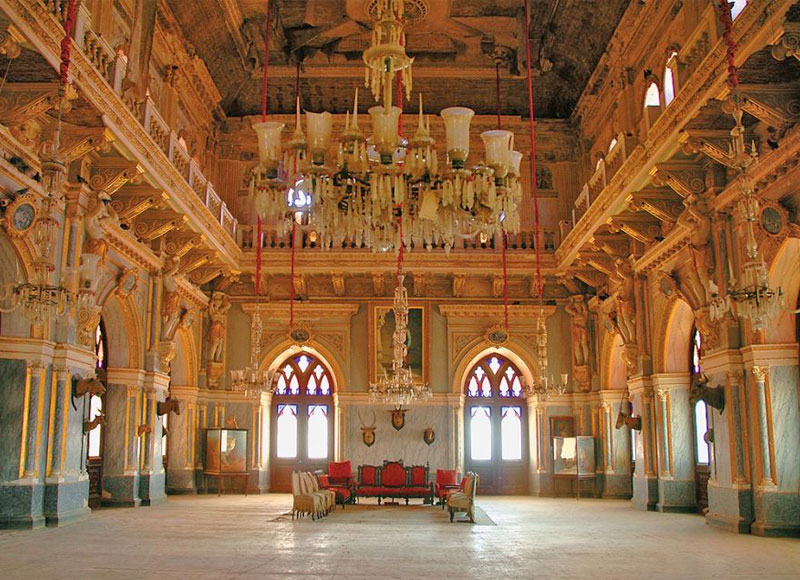
Vijay Vilas Palace, Mandvi
Our palace tour now takes us to the coastal town of Mandvi, home to the beautiful Vijay Vilas Palace. Built-in the 1920s by Yuvraj Vijay Singh of Palitana, this palace showcases the Rajput style of architecture.
As you approach the palace, you'll be struck by its grand appearance. The stone pillars are covered in detailed carvings, and you'll see intricate "jali" work (stone lattice screens) all around. The palace is topped with domed towers that give it a majestic look.
What makes Vijay Vilas Palace special is how it combines different architectural styles. Parts of it look similar to palaces in Datia and Orchha, two historic towns in central India. The main building has a high central dome supported by pillars, with smaller domes on either side.
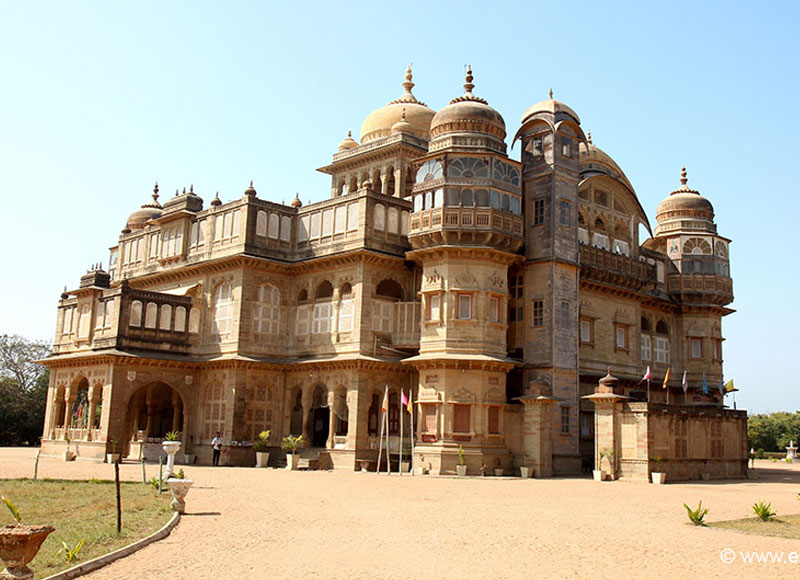
Prag Mahal, Bhuj
Not far from the Aina Mahal in Bhuj, you can find even another beautiful palace: the Prag Mahal. Though less well-known than its neighbor, it is nonetheless equally magnificent and worth seeing.
Designed by Rao Pragmalji in the 19th century, this palace has a European Italian Gothic architectural taste. The huge hall bursting with stuffed animals (taxidermy was a common pastime for royals back then) and the stately Durbar Hall, where significant events were conducted will astound you as soon as you walk in.
Prag Mahal's columns are among its most arresting elements. Designed on the Corinthian form, which came from ancient Greece, they have Beautiful stone filigree work abound as well.
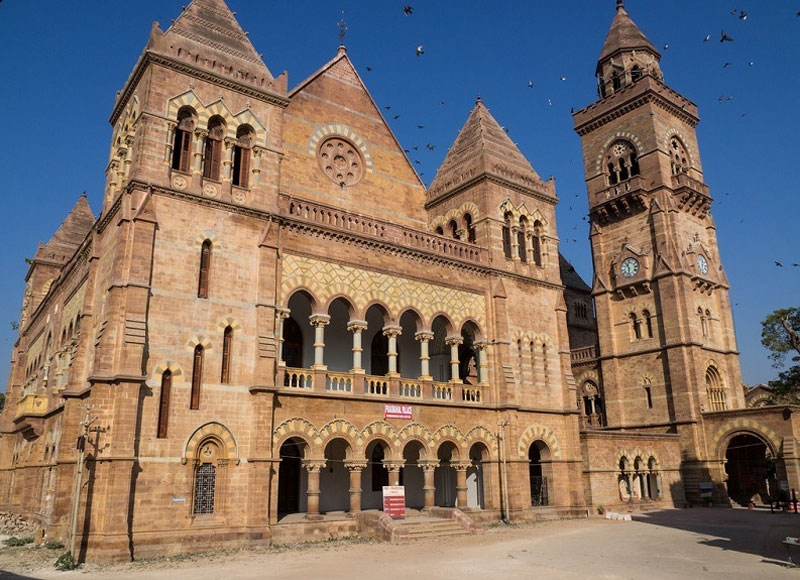
The Palaces of Gondal
Our next trip is to the village of Gondal, home to four remarkable palaces! These comprise the Riverside Palace, Naulakha Palace, Orchard Palace, and Huzoor Palace.
Starting with the Naulakha Palace, let Its moniker, "nine lakhs" (900,000), indicate how much it cost to rebuild in the 18th century—a large sum in those days! Within the Darbargadh fort complex is this palace. From the outside, you will see exquisite carved stonework and charming balconies where the emperors used to relax and take in the fresh wind.
Then comes Riverside Palace. Designed for a crown prince in 1875, it is smaller than Naulakha but has a lovely colonial flair. It is crammed with vintage furnishings that transport you to royal life.
The descendants of Gondal's previous overlords still occupy the Huzoor Palace. Car enthusiasts should visit the Orchard Palace, its extension. The Maharaja's collection of ancient horse-drawn carriages and vehicles is seen here.
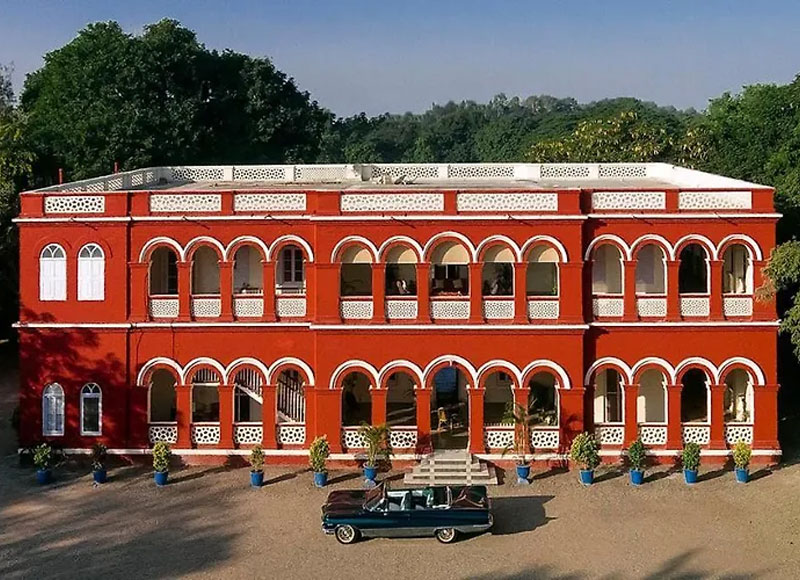
Inquiry Now

Loading.....
Art Deco Palace, Morbi
One well-known town for clock manufacture is Morbi. The Art Deco Palace is a hidden gem though as well. Constructed between 1931 and 1944, this palace is a prime illustration of how European architectural tastes shaped Indian aristocracy.
This palace is distinctive in that it was inspired by a London underground station created by Charles Holden. Though it's difficult to see a castle resembling a train station, the end effect is very stunning.
With two stories and granite construction, the palace is Within are six dining rooms, six drawing rooms, and fourteen bedrooms.
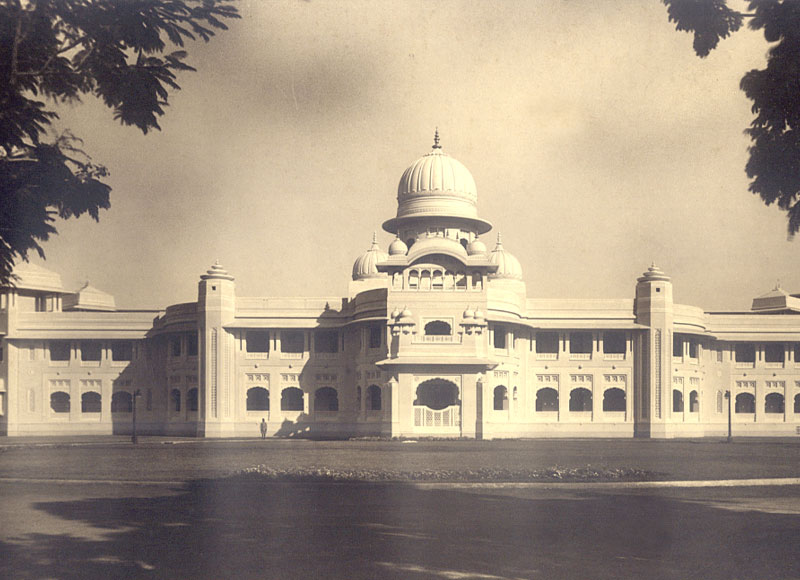
Ranjit Vilas Palace, Wankaner
Then arrives Wankaner's Ranjit Vilas Palace. Constructed in 1907, this palace has a grandeur from its hilltop view of the town.
Ranjit Vilas is interesting in that it combines several architectural forms. Victorian windows will be seen with Gothic arches and Dutch-style roofs. A few sections of it even resemble a French Château.
The seven-story clock tower of the palace, crowned with a lovely Mughal-style dome, is especially arresting. Inside are a museum including thrones, artwork, weaponry, and plush animals.
The collection of classic automobiles originally owned by the Maharaja will appeal to automotive aficionados. And if you enjoy horses, be sure not to miss the local breed from this part of Gujarat, Kathiawari horses in stable.
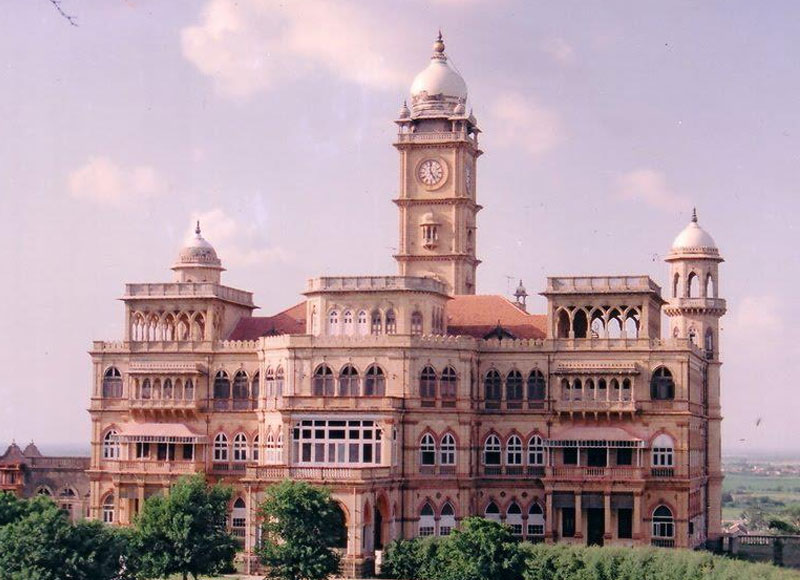
Visiting Gujarat's Palaces With Gujarat Tour Guide
Choosing Gujarat Tour Guide’s tour packages, means you get to tour Gujarat while visiting the best palaces in a hassle-free manner:
- Saurashtra Darshan from Ahmedabad: Go on a journey to discover royal palaces and residences scattered across the Saurashtra region.
- Dwarka Somnath Tour Package with Gir National Park: Experience regal palaces along with spiritual sites and wildlife encounters on this diverse tour.
- Dwarka Somnath Gir with Diu Tour Package: Discover the beautiful and divine landscapes while exploring grand palaces and forts on this comprehensive tour.
- Saurashtra Darshan with SOU: Witness the contrast between ancient royal palaces and modern architectural marvels on this eye-opening expedition.
- Best of Saurashtra Darshan with SOU and Ahmedabad: Trace the evolution of royal architecture from historical palaces to contemporary landmarks across Gujarat.
- Holiday Saurashtra Kutch Tour Package: Visit grand palaces and royal residences across two distinct regions of Gujarat.
- Adventurous Gujarat Tour Packages: Combine palace visits with thrilling outdoor activities for an exhilarating and diverse experience.
- Dwarka Tour Packages from Ahmedabad: Set out from Gujarat's largest city to explore the royal heritage of the western region along with divine temples.
- Dwarka Somnath Tour from Ahmedabad: Visit royal palaces alongside revered spiritual sites in coastal Gujarat on this holy tour.
Contact Gujarat Tour Guide To Get Started!
From the mirror-adorned halls of Aina Mahal to the European-inspired grandeur of Laxmi Vilas Palace, each structure tells a unique story of Gujarat's royal past.
These palaces are not just buildings but a testament to the vision of Gujarat's former rulers and the skill of the artisans who built them. Contact Gujarat Tour Guide today to book your tour package and discover these royal beauties.
